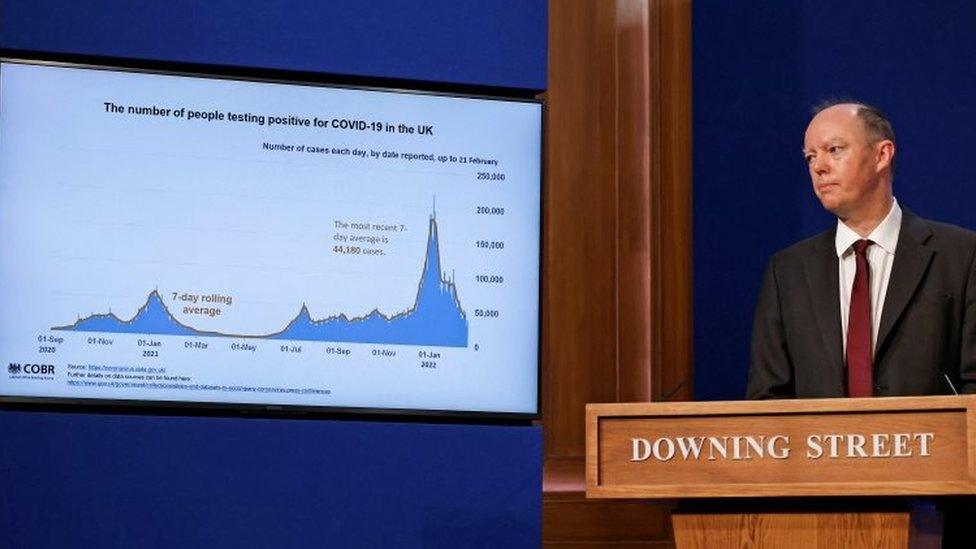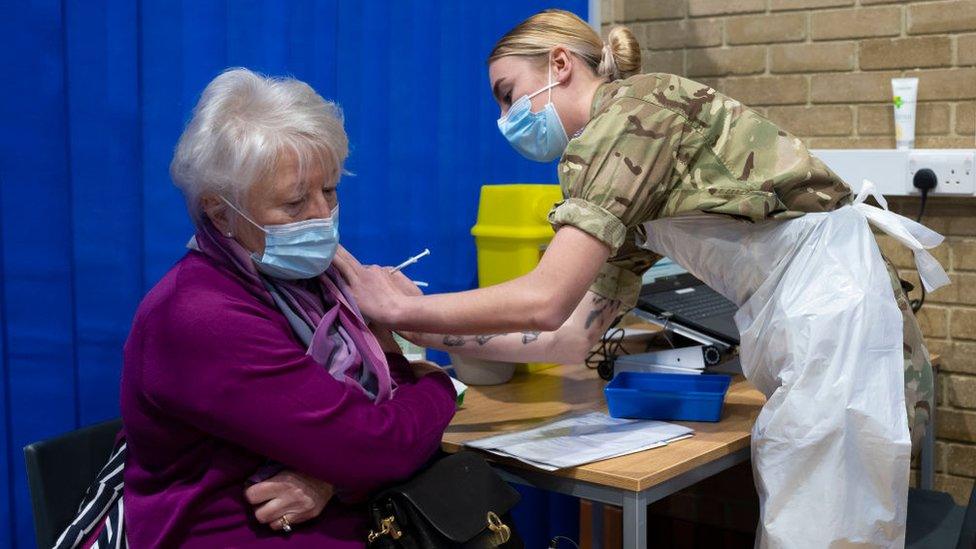Ending Covid laws not without risk or tension
- Published

Sir Chris Whitty emphasised the continuing risks and the need for caution
It isn't over. But as far as the government is concerned, it is largely over to you.
Prime Minister Boris Johnson believes, to the delight of many of his backbenchers, that the time has passed for massive state intervention to manage Covid-19.
Living with the virus, from now on, means millions of us making personal decisions to follow advice rather than be forced to.
From April, it means paying for your own Covid tests, unless you are in a specific job or particular vulnerable group.
It's now up to firms and families to make their own decisions about how to manage the remaining vestiges of the pandemic, rather than the government - whose regulations have limited our lives, to try to save lives, for so long.
First and foremost, removing the legal rules will make practical differences to our lives.
It is also the end of a strange and stressful era, at least in England, when politicians passed laws that controlled almost every aspect of our lives.
For the prime minister, it's a welcome relief to be able to satisfy those in his own party who believed the restrictions have been too tight, in place for too long.
Indeed, if he had tried to renew any of the sweeping powers due to expire, or to extend them one inch, he'd have faced stiff resistance from his own side. He believes the reduction of the risk makes it safe to do so now.
But it is not the end of coronavirus - and loosening up is not without risk, nor without tension.
Money talks
That was obvious from Monday's row in cabinet over what protections should remain in place. The Treasury and the Department of Health were locked in argument over whether any extra cash was to be made available to maintain a big enough testing regime ready for any further waves or new variants.
That fight very publicly delayed the cabinet meeting, which was meant to sign off the changes first thing on Monday morning.
It's suggested that the Department of Health had asked for an extra £5bn to preserve the testing regime at a scale in order to identify any new threats quickly enough and avoid the return of restrictions.
The Treasury's view is that, having already spent billions upon billions, this new phase of living with Covid means the Department of Health will have to live within its means.
I'm told the request was whittled down from over £5bn, to £3bn, then £1.8bn, then in the end an acceptance that cash in the health budget would just be moved around.
Money talks, and the fact that no extra funds were granted, and that Number 10 seems to have sided with the Treasury, illustrates the days of limitless cash to combat Covid are at an end.
Risks remain
And although the prime minister denied there was any gulf between "gung-ho" politicians and more cautious scientists, the inherent tensions in the final decisions were obvious too at the Downing Street press conference on Monday night.
Mr Johnson emphasised his "pride" that restrictions are on the way out. England's chief medical officer, Chris Whitty and the UK's chief scientific adviser, Sir Patrick Vallance, emphasised instead the continuing risks and the need for caution.
The medics highlighted time and again that the changes won't come as one big bang and that risks remain. Mr Johnson has also urged the public not to forget about the caution, but the decisions to relax the rules, to scale back testing, have been taken.
Only in time will the wisdom of the move become clear. At least in England, a significant phase of this extraordinary and agonising moment is coming to an end.
Related topics
- Published21 February 2022

- Published21 February 2022
- Published21 February 2022

